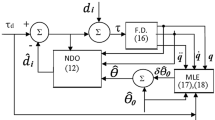Abstract
This paper presents a new frequency-dependent direct adaptive scheme for the optimal and/or suboptimal tracking of the motion of a prescribed model. The idea is based on a closed-loop control scheme in which an 2 H optimal/suboptimal controller is applied in parallel with a direct adaptive technique to guide a robot manipulator to follow a certain prescribed trajectory. The H 2 compensators have to be proper and positively bounded with respect to all dynamic frequencies. Robustness issues are addresses in the paper by lumping all the nonlinear dynamic terms such as the centrifugal and Coriolis effects as well as the mechanical and electrical friction forces of the robot arm, into a general unstructured uncertainty term.
Similar content being viewed by others
References
Zames, G.: Feedback and optimal sensitivity: Model reference transformations, multiplicative seminorms and approximate inverse, IEEE Trans. Automat. Control 26(2) (1981), 301–320.
Zames, G. and Francis, B. A.: Feedback, minimax sensitivity, and optimal robustness, IEEE Trans. Automat. Control 28 (1983), 585–601.
Francis, B. A., Helton, J. W., and Zames, C.: H∞-optimal feedback controllers for linear multivariable systems, IEEE Trans. Automat. Control 29 (1984), 888–900.
Doyle, J. C., Francis, B. A., and Tannenbaum, A. R.: Feedback Control Theory, Maxwell/ Macmillan International Editions, Ontario, Canada, 1992.
Francis, B. A.: A Course in H∞-Control Theory, Lecture Notes in Control and Information Sciences, Springer, 1987.
Chang, B. C. and Pearson, J. B.: Optimal disturbance reduction in linear multivariable systems, IEEE Trans. Automat. Control 29 (1984), 880–887.
Safonov, M. G. and Verma, M. S.: L∞—sensitivity optimization and hankel approximation, IEEE Trans. Automat. Control 30 (1985), 279–280.
Kwakernaak, H.: Robustness optimization of linear feedback systems, in: 22nd IEEE Conf. on Decision and Control, San Antonio, TX.
Verma, M. and Jonckheere, E.: L∞—compensation with mixed sensitivity as a broadband matching problem, Systems and Control Letters 4 (1984), 125–130.
Doyle, J. C., Glover, K., Khargonekar, P. K., and Francis, B. A.: State-space solutions to standard H2 and H1 control problems, IEEE Trans. on Automat. Control 34(3) (1989).
McFarlane, D. C. and Glover, K.: Robust controller design using normalized coprime factor plant descriptions, in: Lecture Notes in Control and Information Sciences, Springer, 1982.
Kurylowicz, A., Jaworska, I., and Tzafestas, S. G.: Robust stabilizing control: An overview, in: S. G. Tzafestas (ed.), Applied Control: Current Trends and Modern Methodologies, Marcel Dekker, New York, 1993, pp. 289–324.
Jaworska, I. and Tzafestas, S. G.: Improvement of system reliability using robust control theory, Int. J. Systems Sci. 22 (1991), 587–593.
Jaworska, I. and Tzafestas, S. G.: Robust stability analysis of robot control systems, J. Robotics and Autonomous Systems 7 (1991), 285–290.
Casavola, A. and Mosca, E.: H∞-and H2 simple controller for robotic applications, Int. J. Control 55(2) (1992), 329–341.
Youla, D. C, Bongiorno, J. J., and Jabr, H. A.: Modern Wiener–Hopf design of optimal controllers – Part I, IEEE Trans. Automat. Control 21 (1976), 3–13. JINT1208.tex; 10/03/1998; 9:04; v.7; p.20
Youla, D. C, Bongiorno, J. J., and Jabr, H. A.: Modern Wiener–Hopf design of optimal controllers – Part II, IEEE Trans. Automat. Control 21 (1976), 319–338.
Morari, M. and Zafiriou, E.: Robust Process Control, Prentice-Hall, 1989.
Chen, M. and Desoer, C.: Necessary and sufficient conditions for robust stability of linear distributed feedback systems, Int. J. Control 35 (1982), 255–267.
Doyle, J. and Stein, G.: Multivariable feedback design: Concepts for a classical modern synthesis, IEEE Trans. Automat. Control 26 (1981), 4–16.
Patterson, D. W.: Artificial Neural Networks, Prentice-Hall, 1996. JINT1208.tex; 10/03/1998; 9:04; v.7; p.21
Author information
Authors and Affiliations
Rights and permissions
About this article
Cite this article
Tan, C.C., Zomaya, A.Y. A Frequency-Dependent Direct Adaptive Scheme for Robot Manipulators: A Case of Model-Following Motion Control. Journal of Intelligent and Robotic Systems 22, 1–22 (1998). https://doi.org/10.1023/A:1007971904754
Issue Date:
DOI: https://doi.org/10.1023/A:1007971904754




